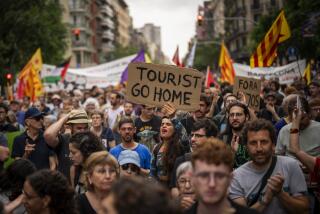EGYPT : Cairo Using Police, Publicity to Assure Tourists That Land of Pharaohs Is Safe
- Share via
CAIRO — Crossing over the busy Qasr el Nil Bridge into downtown Cairo, morning commuters have been treated to the specter of a wild-eyed figure, a knife raised menacingly over its head, and a message: “Say No to Terrorism.”
Similar posters papered much of the central city for several days last month, the latest assault in the Egyptian government’s campaign to convince the public that the land of the pharaohs is still a place tourists would want to visit.
The message needed stressing, with Egypt’s $3-billion-a-year tourist industry reeling under a spate of Islamic extremist attacks on foreign travelers, most recently a firebomb hurled at a mostly empty tour bus near the Pyramids this week.
Tourist bookings have taken a dramatic slide over the past two months, and while the government still seems to be winning the war on terrorism, it has taken casualties. And the battle may not be over yet.
THE INCIDENTS: One woman was killed and 17 foreigners were wounded in at least 12 attacks against tourists since last summer, nearly all of them in the regions of southern Egypt, near the temples of Luxor, that are the hotbed of Islamic fundamentalism here.
In the worst such incident, gunmen attacked a tour bus on Oct. 21 near Dairut, killing a British nurse and wounding two British men.
Nile cruise boats were attacked from ashore twice last fall; no foreigners were hurt. And on two occasions, in Luxor and Port Said, men who appeared to be Islamic fundamentalists stabbed and slightly wounded seven tourists.
Tour buses have been the most frequent targets. Gunmen or firebomb-throwers have attacked seven buses, the two most recent incidents occurring on Pyramids Road in Cairo itself--the first such attacks in the capital. No injuries occurred in either case.
THE REASONS: Muslim fundamentalists--a minority in freewheeling Egypt--have long complained about tourists who engage in un-Islamic practices, including skimpy dress, public displays of affection and drinking alcohol.
But the fundamentalists’ real aim is to destabilize the government, which they regard as illegitimate and which they would like to replace with a strict Islamic regime. Attacking the government’s main source of revenue is seen as the most efficient approach.
Fundamentalist groups have recently refined their approach, mailing anonymous letters to European travel agents warning them not to send their clients to Egypt.
THE EFFECTS: An estimated 100,000 travelers canceled their bookings to Egypt during the peak months of December and January, and the year’s total was about 200,000 travelers below original forecasts.
Hotel occupancy is sluggish all over the country. At a time when most facilities are booked at 85% to 90%, average occupancy is down to 50% to 65%, according to national Tourism Ministry figures. Several hotels near the Pyramids in Cairo, in Luxor and at Sinai Peninsula resorts were barely half full.
Still, the picture wasn’t entirely gloomy. Overall tourism in Egypt was up 45% through the end of 1992, reflecting a basically healthy market--if tourists can be convinced it’s safe here.
THE COUNTERATTACK: Government officials are rounding up extremists and putting them in jail before they can attack again. They are also pressing a public relations campaign pointing out that Egypt remains one of the safest places anywhere to take a vacation.
At least 1,300 people have been arrested in police sweeps in Cairo alone since the beginning of December, and huge numbers have also been detained in southern Egypt. Most have been released after police weeded out the suspected extremists.
Security forces have also visibly increased patrols on Cairo streets and along the main highway in southern Egypt. Plainclothes officers patrol the most heavily populated tourist areas.
Tourism officials launched their own offensive, targeting travel agents and journalists. The message: Crime is far worse in Europe and the United States than here.
To bring the message home, the billboards and posters went up all over Cairo last month, depicting grotesque, menacing figures and captions like, “This Does Not Belong to Islam.”
That part of the campaign backfired when several columnists pointed out that the disturbing images might be hurting more than helping. “It’s a bit like a chef entering the dining hall in a five-star restaurant,” suggested the Egyptian Gazette’s Mohammed Shebl, “and shouting, ‘There are absolutely no rats in the stew!’ ”
Aly Assem, a researcher in The Times’ Cairo Bureau, contributed to this report.
More to Read
Sign up for Essential California
The most important California stories and recommendations in your inbox every morning.
You may occasionally receive promotional content from the Los Angeles Times.










